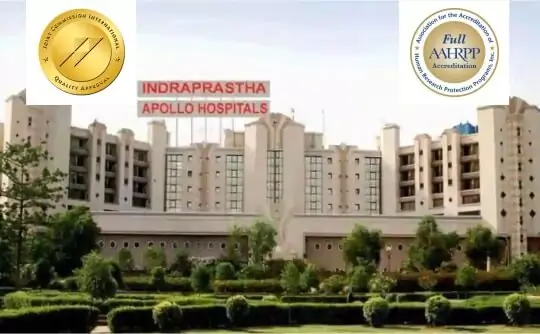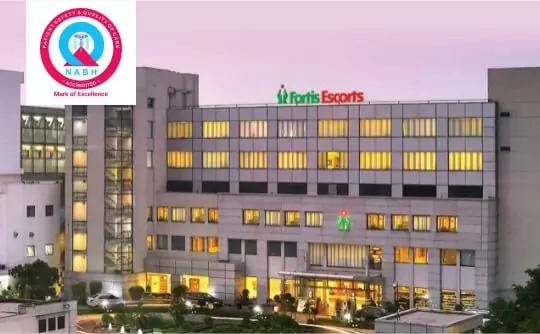

The overall Angioplasty surgery cost in India is influenced by the number of stents required. A stent, a small metal mesh tube, is inserted into a coronary artery and expanded to keep the artery open. Typically, Angioplasty involves placing a stent to help prevent the artery from closing up again.
A significant component of the Angioplasty surgery cost in India is the heart surgeon's fees. IndiCure recommends highly experienced, skilled, board-certified heart surgeons who can deliver excellent results. While the charges may vary based on the surgeon's experience, you can be confident that you are in safe and capable hands when opting for affordable heart surgery in India with IndiCure Health Tours.
A major factor in the Angioplasty surgery cost in India is the specific procedure performed. The three main types are balloon Angioplasty, stenting, and rotablation. IndiCure advises consulting with their expert cardiologists to explore the best surgical option for your needs. Additionally, ongoing innovations and advancements in surgical techniques and technologies may enhance patient care but can also impact the overall cost.
Selecting an accredited medical facility with skilled and qualified medical staff is essential for the success of your Angioplasty surgery in India. Larger cities in India generally provide superior medical facilities and more experienced surgeons, leading to higher costs. In order to prioritize the safety of overseas patient guests, IndiCure Health Tours recommends surgical facilities in these larger cities.
The surgery-related expenses include the pre- and post-surgical expenses. The pre-surgical expenses are associated with the age and medical condition of the patient and thus the number and type of investigations required. Post-surgical expenses may include prescription medications and follow-up consultations.
At IndiCure, we consolidate most of the expenses for your Angioplasty surgery in India to provide you with an inclusive and cost-effective package tailored to your budget and individual requirements. After receiving medical reports, your case manager will provide an estimated cost based on a discussion with the heart surgeon.
The final Angioplasty surgery cost in India can however be confirmed after your face-to-face consultation with the heart surgeon.

We Help you Choose the Right Treatment, Surgeon & Hospital

We Arrange Video/Telephonic Consultation with the Surgeon

We Assist you with Visa & Accommodation

We Receive you at the Airport and Drop you at Hotel/Hospital

We Assist you the at Hospital & Provide Post Operative Support
IndiCure offers exclusive savings on your medical travel to India. We partner with best hospitals in India and negotiate special rates, ensuring you get the best possible price on your healthcare when you plan you r medical tour with us.

Here is a set of questions you should consider asking before commencing your medical tour for Angioplasty surgery in India
Prepare to answer questions about your:
Angioplasty, also known as coronary angioplasty or percutaneous coronary intervention is a minimally invasive procedure used to widen the occluded blood vessels or to relieve stenosis (blockage) of blood vessels to ensure proper blood flow to the heart. The procedure is done when a person develops Coronary Artery Disease or CAD.
Coronary Artery Disease (CAD) causes arteries to get stenosed or become narrow because of the deposition of calcium and fat called plaque on the arterial walls. This build-up is called atherosclerosis, which if left untreated, can lead to heart attack.
Angioplasty can be performed for two main reasons:
Your doctor would recommend you to undergo an angioplasty if:
Not everyone suffering from CAD or atherosclerosis is a good candidate for Angioplasty. If your heart muscles are already weak if you have blockages in multiple vessels or if the narrowing is in the main artery bringing blood to the heart, you would need a Coronary Artery Bypass Graft, or CABG commonly called open heart surgery.
The procedure is performed under local anesthesia combined with sedation in a Cath. The area, typically the groin or arm, is thoroughly cleaned and prepared. Blood-thinning medications are administered to reduce the risk of blood clots during the procedure.
A needle is inserted into the artery and a guide wire is passed through it. The wire is manipulated to blockage and a catheter is passed over the wire to reach the blockage. The location of all tubes and catheters are checked for position with proper diagnostics.
A balloon at the catheter tip is expanded and deflated to relieve the artery narrowing. A stent can be placed after expansion to maintain the expanded status of the artery and keep it patent. The incision is closed and dressed. The patient is monitored for blood pressure.
Patients can be discharged after an overnight stay at the hospital. It depends on the condition of the patient's health and the doctor's advice. After surgery the patient is advised to have a lot of fluid intake and not to do any heavy lifting, exercise, or smoking for the next 24 hours.
Angioplasty increases blood flow through narrowed and blocked arteries. Angina is decreased and health improves with exercise. With proper changes in lifestyle and medications, the improvement of health is good. No further surgery is usually necessary, such as bypass after a successful coronary angioplasty.

New Delhi
Indraprastha Apollo Hospitals, New Delhi is a state of the art multi speciality tertiary-care hospital situated in the most posh area of South Delhi. Considered to be the flagship hospital of Apollo group, Indraprastha Apollo Hospital is one of the important landmarks not only in Delhi, but in the world map because of its popularity among the medical tourists. The hospital has been one of the most sought after medical institutions for patients from Asia Pacific and beyond.

New Delhi
Fortis Escorts Heart Institute and Research Centre is one of the most revered medical institutions not only in India, but the entire world. The institute has set benchmarks in cardiac care with path-breaking work over the last 25 plus years. The hospital has the most advanced technology and has seen the best outcomes even in the most complex cardiac cases; be it cardiac surgery, Interventional Cardiology, Pediatric Cardiology, Pediatric Cardiac Surgery or Non-invasive Cardiology
Angioplasty cost in India starts from USD 3,500 for one stent and varies depending on many factors listed above.
Angioplasty has a 97 percent success rate, with 1 percent multivessel disease and a 2% incidence rate of myocardial infarction.
The average recuperation period for angioplasty is two weeks, however, this can vary depending on your health. Stick to Your Medication Regimen: It's critical to follow your medication schedule. Stopping your medicine too soon can put you at risk for a recurrence of cardiac condition.
It's possible that you'll feel pressure when the catheter is introduced. When the balloon is inflated and your artery is stretched, you may have some slight discomfort, but you should not experience any acute pain throughout the process.
A coronary angioplasty takes from 30 minutes to 2 hours on average, but it might take longer. On an X-ray table, you'll be instructed to lie down on your back. You'll be hooked up to a cardiac monitor and numb your skin with a topical anesthetic.
Angioplasty is generally safe, but speak with your doctor about the risks. The following are some of the risks associated with angioplasty and stent placement: Allergic reaction to the medicine in a drug-eluting stent, the stent material (which is extremely rare), or the x-ray dye. In the place where the catheter was put, there could be a rare chance of bleeding or clotting.
You should be able to return to work after a week if you had a scheduled (non-emergency) coronary angioplasty. If you had an emergency angioplasty after a heart attack, however, it may take several weeks for you to fully heal and return to work.
Long-term repercussions necessitate lifestyle modifications, such as maintaining a healthy body weight and eating a low-fat, high-vegetable diet. Control your cholesterol and cholesterol levels, and take antiplatelet medicines as directed. Exercise is also important.
It depends on your overall health. If you're being treated for angina, you'll usually be discharged from the hospital the same or next day once the procedure is completed. If you've already been admitted to the hospital for a heart attack, you would need to stay in the hospital for a few days after the angioplasty procedure. For patients coming from abroad, it is advisable to stay for 5-6 days in India after your planned angioplasty before you go back home.
Walking, climbing stairs, and performing normal tasks are usually safe. Your doctor will probably tell you that you can resume moderate activities after five days, but you should avoid overexertion that causes shortness of breath, weariness, or chest pain.
Apart from the Angioplasty surgery cost in India, you should also prepare for the additional expenses when planning your medical trip to India. This includes budgeting for meals beyond the hospital stay, airfare costs from your location to destination city of your surgery, and ground transportation expenses, such as taxi fares or rental car costs. Lastly, hotel or serviced apartment accommodation costs during your recovery period are crucial to consider. You have the choice of opting for a hotel or serviced apartment to suit your preferences and budget.
By carefully considering these additional expenses alongside Angioplasty surgery cost in India, you can better plan and budget for your complete medical trip to India, ensuring a smooth and hassle-free recovery process.
Enhance your medical journey to India by availing these extra services.
Traveling abroad for medical reasons may be challenging. With our experience of over a decade and working with the best surgeons and top hospitals in India, we help make your medical tour easier and safer for you. We will guide you at every step of the way and make end-to-end arrangements for your surgery, travel, and stay.
Ramandeep Dhaliwal
a month ago
I had great experience having rhinoplasty through Indicure. Dr. Ruchika from Indicure has helped me in finding best plastic surgeon, answering all my questions...
Read More
Joshua Archer
3 months ago
My name is Joshua Archer I'm from New Zealand, bay of plenty, kawerau I opted for the bypass surgery in January 2023 but planned it in advance for 28 September found IndiCure...
Read More
Kera Ren
8 months ago
Absolutely loved my experience with IndiCure - from first inquiring to meeting the surgeon pre op to my follow up post op. The surgeon was extremely approachable...
Read More
Andreana Paul
5 months ago
Had a wonderful experience. Visited India for my plastic surgery. From sending mails, airport pickup, comfortable accommodation and, to smooth hospital appointment booking...
Read More
Brandi Luce
5 months ago
I had the privilege of using Indicure's services for a cosmetic procedure that I had wanted for a long time but had always been apprehensive about. Ruchika helped me...
Read More
Jade M
3 years ago
Indicure Health Tours went above and beyond my expectations. They helped me with every aspect of my journey and were professional, kind and caring. I was...
Read More
The content on the website (www.indicure.com) is intended to be general information and is provided only as a service. All photographs on our website of before and after results are examples only, and do not constitute an implied or any other kind of certainty for the result of surgery.
Learn about IndiCure Health Tours' comprehensive editorial policy that strives to deliver trustworthy, helpful, relevant, accurate and people-first content on medical tourism in India.
It is not medical advice and should not be taken as medical advice. It should not be used to diagnose or treat a health condition and is in no way meant to be a substitute for professional medical care. You are advised to see a surgeon in person to assess what surgery may or may not accomplish for you.
It is also important to keep your expectations realistic and to understand that all surgical procedures carry risks and should never be taken lightly.